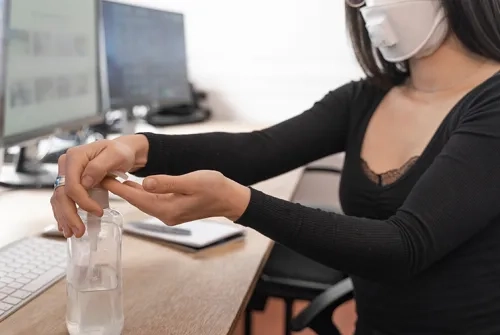Alo Yeditepe
Alo Yeditepe
How Should Kidney Patients Be Protected From COVID-19 Coronavirus?
As we all know, the COVID-19 infection, which is a disease caused by the newly detected coronavirus that causes disease in humans, has turned into a pandemic. Prof. Dr. Gülçin Kantarcı, who said that kidney involvement was found to be common in this infection, reminded us that acute kidney damage that may develop is an independent determinant of the risk of loss of life.
Stating that there are not enough studies yet on the general effects of this infection in patients with chronic kidney disease, Yeditepe University Hospitals Internal Medicine and Nephrology Specialist Prof. Dr. Gülçin Kantarcı said, “We must ensure that chronic kidney patients, dialysis patients, kidney transplant patients and patients whose immune system is suppressed due to other different problems are protected without causing concern but by taking all necessary precautions.”
Prof. Dr. Gülçin Kantarcı listed the precautions to be taken to protect kidney patients and transplant recipients from infection, who are considered to be in the risky group for COVID-19...
Avoid Touching Face with Hands
Reminding that this infection is transmitted through droplets, Prof. Dr. Gülçin Kantarcı said, “In other words, it is transmitted by coughing and sneezing of sick individuals, breathed by other people, or by touching and contacting the mouth, nose, or eye mucosa after touching the surfaces with the viruses spread from these droplets. For this reason, care should be taken not to touch the face and eyes with the hands as much as possible.”
Do Not Enter Crowded Environments and Do Not Contact People Coming from Abroad
Stating that kidney patients should be careful not to use public transport as much as possible during this period, Prof. Dr. Kantarcı said, “If it is necessary to take public vehicles, necessary precautions must be taken. Masks should be used, and hands should be cleaned with hand sanitizer. However, they should not attend crowded meetings and should not enter such environments. These people should not travel abroad and should avoid contact with people who have come from abroad in the last two weeks.”
If There Is Any Sign of Disease, the Relevant Center Should Be Informed in Advance
Stating that patients who have undergone organ transplants or dialysis patients with symptoms such as fever or cough should give information by phone before coming to the relevant centers or dialysis units, Prof. Dr. Gülçin Kantarcı said that they should act according to the directions of the units where they are treated and that they should definitely wear masks.
Mask Should Be Used
Emphasizing that in addition to hygiene rules such as washing hands constantly with soap and water, these patients must wear masks when in contact with people, Prof. Dr. Gülçin Kantarcı gave the following information: “In Taiwan, where this infection first started and is most commonly observed, the Nephrology Societies recently recommended that patients wear masks in the dialysis unit in their guidelines for dialysis units during the COVID-19 pandemic. For this reason, patients should wear a mask before coming to dialysis. Used masks should always be thrown into the waste bins with a lid. After putting on and taking off the mask, hands should be washed with soap for 30 seconds.”
What Should Be Done to Avoid Viral Epidemics in General?
- Get an influenza vaccine every year if your doctor recommends it,
- Ventilate your home 2 times a day.
- Wash your hands frequently with soap and water for 30 seconds or use an alcohol-based hand cleaner.
- Avoid touching your face with your hands.
- Stay at least 2 meters away from people with respiratory symptoms such as coughing and sneezing.
- Take care not to dry your throat during the day and drink warm sugar-free drinks.
- If you have signs of illness (fever, cough, sore throat, headache, or body aches) or flu-like symptoms, stay home if possible.
- Cover your coughs and sneezes with a tissue and throw used tissues and masks into waste bins with a lid.
- Clean and disinfect surfaces (including phones, computers, and tablets) and items you come in contact with.
About
Faculty and Year of Graduation:
Uludag University Faculty of Medicine 1984-1990
”
See Also
- What is Hypoglycemia?
- Common Misconceptions About Kidney Transplantation
- Kidney Diseases and Treatment Methods
- 10 Questions About Kidney Transplantation
- How Should the Daily Salt Consumption Amount Be?
- Misconceptions About Hypertension
- Chronic Kidney Disease and Treatment Methods
- What is Hypertension?
- Things Wondered About Kidney Transplantation and Organ Donation
- If You Consume More Than 5 grams of Salt...
- The Frequency of Hepatitis Seen in Dialysis Patients Is Decreasing
- 12-Year-Old Tuğba Nur Survived with Transplant
- Excess Protein Does Not Increase Muscle Mass, and It Impairs the Kidneys
- AV FISTULA Should Be Done At The Right Time For Hemodialysis Patients
- Pay Attention to Kidneys in Pregnancy!
- He Held On To Life with His Brother's Kidney
- Recommendations to Strengthen the Immune System
- Kidney Failure Caused by Ear Obstruction
- There is Still a Lot of Misconception About Organ Donation
- He Lost 20 Kilograms in 40 Days for His Wife
- One Out of Every Seven People Has Kidney Disease
- What is Propolis? How to Use Propolis?
- Improper Nutrition Invites Kidney Failure
- Important Warning from the Expert: “Not Adding Salt to Meals Alone Is Not Enough”
- Tissue Harmony Is Also Important for Success in Kidney Transplant
- Phytotherapy and Immune System
- Hereditary Kidney Diseases Are Underrecognized!
Alo Yeditepe





